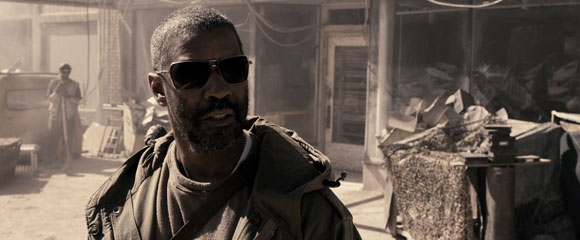The Book of Eli

While James Cameron’s Avatar explores the White Messiah Complex, The Book of Eli reliably returns us to that staple of action films, the Angry Black Man—but with a twist. He’s also Mystical Black Man, carrying with him a book of considerable importance and influence in the affairs of humankind, and plenty of aphorisms to go with.
I won’t reveal the title and spoil the twist. I will, however, try to relate what a mindless gorefest this film, otherwise inhabited by able actors, turns out to be. In a post-apocalyptic America, or whatever other country it ends up being since the concept of federal government seems to have disintegrated anyway, Eli (Denzel Washington), a loner with good aim and an appetite for cats, makes his way westward to fulfill his destiny as foretold to him by a voice. I assure you, however, there’s nothing supernatural going on.
On his way, he encounters thieves and cannibals—a consequence of limited resources. He stumbles into a town run by the resident lunatic, Carnegie (Gary Oldman, an actor with a diverse range of crazy) commanding a posse of typically-incompetent mercenaries. With a streamlined machete-like blade, Eli slices and dices his adversaries like butter. This never really provides us with satisfying action because it’s quickly established that he’s pretty impervious to any attack. But action violence is mostly what comprises this film. Little else takes place. But, I’ll summarize: Claudia (Jennifer Beals), enslaved by Carnegie, takes care of Eli when he’s brought in under their “hospitality.” Carnegie, finding his own mercenaries thoroughly useless in his search for a particular book, tries to woo Eli into his clan. Eli doesn’t budge. He’s on a mission from god… like Jake and Elwood, minus Jake, and with cooler sunglasses. Carnegie prostitutes Claudia’s daughter, Solara (Mila Kunis) to sweeten the deal. Eli is unmoved, and instead begrudgingly opens up to her about his mission.
This is the sort of Road Warrior-influenced film where the protagonist is referred to as a “walker” because, well, he walks a lot. His journey doesn’t have any depth, though. We don’t see the genesis of this journey, so we can’t understand why he took it so seriously until the end turns the meaning of that revelation on its side. I wondered if the first-time writer, Gary Whitta, and the directors, the Hughes Brothers (From Hell), worked out the intriguing finale and then wrote backward from there to lead up to it. But the ending, complete with the Grey-Haired Scholar and cultural preservationist (played by Malcolm McDowell, whose cameo gets an instant laugh as if it was the oddest choice, or just a bad wig), has been done before in virtually every dystopian future, e.g. Children of Men. There, Michael Caine had the intellectual role photocopied straight from Faber in Ray Bradbury’s Fahrenheit 451.
The film makers built a facade but not a whole house. Questions invariably arise, shattering suspension of disbelief. Example: If corporate supply chains are gone, who’s manning the refineries to produce the petroleum that Carnegie’s gang uses? Maybe the cars run on cat oil? We don’t know. A story needs to feel like the borders of its world don’t end at the edges of the page.
It’s unfortunate, because a film like this has promise to at least entertain, if shallowly so and without any truly provocative discourse, but this film manages neither. While there’s good chemistry between Mr. Washington and Ms. Kunis, it’s a tired device of the desperate disciple. The movie lacks sufficient build-up to make us care about his journey until it’s already over. It’s so sparsely populated with ideas, but so generously peppered with product placement. Even the fight scenes are slowed down, as if there weren’t enough kicks, punches and slashes to fill time at normal speed—or to ensure we got a really good look at that pristine, full-color ad on the side of a semi truck, against an otherwise disheveled world of browns and greys.
 The Book of Eli • Dolby® Digital surround sound in select theatres • Aspect Ratio: 2.39:1 • Running Time: 118 minutes • MPAA Rating: R for some brutal violence and language. • Distributed by Warner Bros. Pictures
The Book of Eli • Dolby® Digital surround sound in select theatres • Aspect Ratio: 2.39:1 • Running Time: 118 minutes • MPAA Rating: R for some brutal violence and language. • Distributed by Warner Bros. Pictures